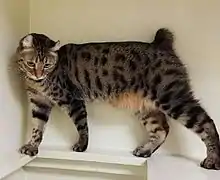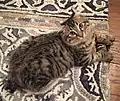Highlander cat
The Highlander (also known as the Highlander Shorthair, and originally as the Highland Lynx), is an experimental breed of cat. The unique appearance of the Highlander comes from the deliberate cross between the Desert Lynx and the Jungle Curl breeds, also recently developed. The latter of these has some non-domestic ancestry from two Asian small cat species, the leopard cat and jungle cat, making the Highlander nominally a feline hybrid, though its foundation stock is mostly domestic cat.
| Highlander | |
|---|---|
 | |
| Other names | Highlander Shorthair, Highland Lynx |
| Origin | United States |
| Foundation bloodstock | Desert Lynx and Jungle Curl, the latter a domestic–wild hybrid |
| Breed standards | |
| TICA | standard |
| Other | REFR recognized, no standard |
| Notes | |
TICA status is Preliminary New Breed, not yet eligible for championship competition. | |
| Feline hybrid (Felis catus × F. chaus × Prionailurus bengalensis) | |
Description
The Highlander originated as a crossbreed of the experimental Desert Lynx breed and the Jungle Curl, to add the latter's curled ears to the former.[1][2][3] As with Desert Lynxes, they are bobtailed or short-tailed, have spotted or marbled markings, and resemble the bobcat.[1][4] The Highlander has a long sloping forehead and blunt muzzle with a very wide nose.[4] The eyes are wide-set and the ears are upright with a slight curl and a slight turn in the backward direction.[4] Some have polydactyl paws.[2][3] Highlanders have no known health problems, and are fond of water.[2][3] The body is substantial and very muscular.[3][4] Females can grow to between 10 and 14 pounds, and the males between 15 and 20.[2][3] Despite the "big-cat look", the Highlander is a human-oriented, friendly and playful cat, and very active and confident.[2] The Highlander displays tabby/lynx point or solid point coloration in various colors.[5]
History
The Highland Lynx breed development began in 1993 as a crossbreed of the experimental Desert Lynx breed and the Jungle Curl, to add the latter's curled ears to the former.[1] Although given a name that included "lynx", it is without any actual wild lynx (including bobcat) ancestry.[3] Recognized by the Rare and Exotic Feline Registry under the name Highland Lynxes, the nascent breed is classified by REFR as part of the Desert Lynx breeding group, which also includes the Desert Lynx, Alpine Lynx, and Mojave Bob.[1]
The Highlander breed refinement began in 2004, to distinguish the breed better from its foundation stock, and to seek competition status in major breed registries.[4] The name Highlander was adopted in late 2005.[3][4] Starting May 1, 2008, the breed was recognized by The International Cat Association (TICA) for competition in the Preliminary New Breed class,[4] and in 2016 was moved up to Advanced New Breed.[6] TICA divides Highlanders into two varieties, under the names Highlander Shorthair (HGS) and simply Highlander (HG) for the longer-haired variation.[4][7]
_Hugo_by_TAnthony.jpg.webp) Closeup of Highlander face, with curled ears and distinctive facial features.
Closeup of Highlander face, with curled ears and distinctive facial features._Hugo_by_TAnthony.jpg.webp) Tabby markings and bobtail.
Tabby markings and bobtail._Hugo_by_TAnthony.jpg.webp) Male Highlander cat.
Male Highlander cat. Male Highlander cat, with polydactyl paws.
Male Highlander cat, with polydactyl paws. Eyes and long whiskers.
Eyes and long whiskers. Closeup of a polydactyl paw, which occurs in some Highlander cats.
Closeup of a polydactyl paw, which occurs in some Highlander cats._Hugo_by_TAnthony.jpg.webp) Highlander kitten.
Highlander kitten. Highlander juvenile, 4 months old, with polydactyl paws.
Highlander juvenile, 4 months old, with polydactyl paws.
References
- "Highland Lynx". Rare and Exotic Feline Registry. 2016 [2004]. Retrieved August 15, 2016.
- "Highlander". Cats 101. Season 4. Animal Planet. Retrieved August 16, 2016.
- "Highlander". PetGuide.com. Retrieved August 16, 2016.
- "Highlander Shorthair". TICA.org. The International Cat Association. August 13, 2018. Retrieved January 6, 2020.
- "Highlander Cat Stats". Catster. Archived from the original on August 22, 2016. Retrieved August 16, 2016 – via Catchannel.com.
- "Browse All Breeds: Advanced New Breeds". TICA.org. The International Cat Association. August 13, 2018. Retrieved January 6, 2020.
- "Highlander Breed Group (HG/HGS) Standard" (PDF). TICA.org. The International Cat Association. May 1, 2015 [2014]. Archived from the original (PDF) on June 19, 2018. Retrieved January 6, 2020.